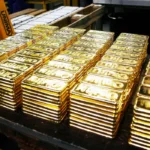Copper dropped for a second day in a row as speculations arose Fed might scale back its Quantitative Easing program after the upcoming Federal Open Market Committee meeting. Demand outlook for the industrial metal is also looking grim as China, the worlds biggest consumer, is expected to have slowed down its economic growth.
On the Comex division of the New York Mercantile Exchange, copper futures for July delivery traded at $3.174 a pound at 8:59 GMT, marking a 0.75% daily loss. Prices of the metal ranged between daily high and low at $3.219 and $3.172 a pound respectively.
Copper, as other dollar-priced commodities, has been fluctuating whenever speculation is spurred that the U.S. central bank might taper its bond purchasing program. Quantitative Easing has been a factor of fluctuation as dollar-priced commodities trade inversely to the greenback and events that determine the U.S. currencys value also move up or down the raw materials.
Cao Yanghui, an analyst at Nanhua Futures Co. said for Bloomberg: “Copper is likely to be capped in a range in the short term. Investors seem to have lost the interest as there are more negative factors than positive ones now.”
The industrial metal’s prices were pressured last week after the World Bank cut its global economy growth forecast. According to its report, the global economy will expand 2.2% this year, less than the previous projections of 2.4% in January. Gross Domestic Product in the European Union will contract by 0.6%, while the U.S. and Japan will show improvement, the World Bank said.
Chinas demand outlook dropped as the countrys economic growth projections were trimmed recently. Recent figures showed China’s manufacturing slowed down. The World Bank reduced its forecast for the nation’s economic growth to 7.7%, down from 8.4%. This comes after during the last week of May the IMF cut its economy growth forecast for China to 7.75%, down from 8%. The Organisation for Economic Co-operation and Development also trimmed its expectations to 7.8% from 8%. Chinese leaders made statements in May they will tolerate a slower, but more ecological friendly expansion, boosting concerns for commodities demand. Concerns about Chinas economy slowing down have pressured copper prices as the country accounts for 40% of global consumption and the metal is widely used in the industrial production.





